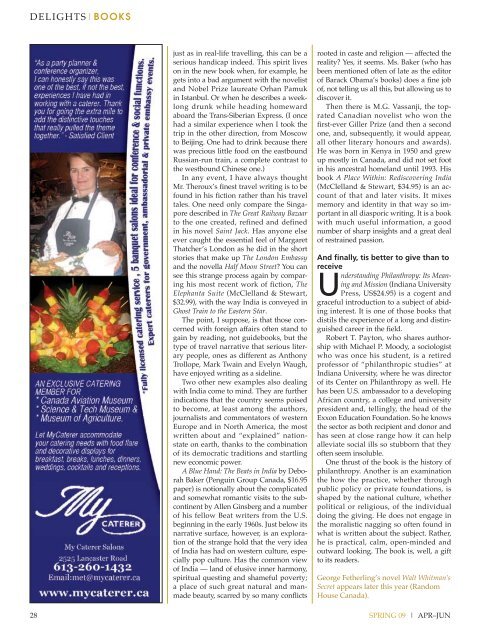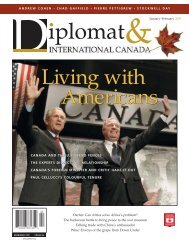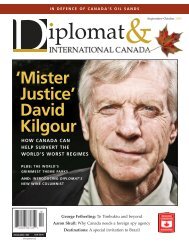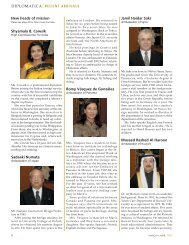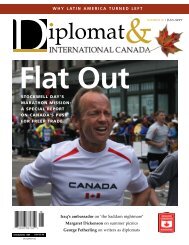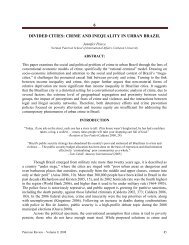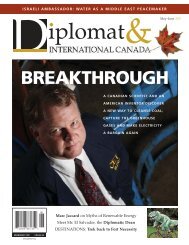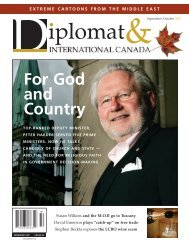Lord Jim of Dilling - Diplomat Magazine
Lord Jim of Dilling - Diplomat Magazine
Lord Jim of Dilling - Diplomat Magazine
- No tags were found...
Create successful ePaper yourself
Turn your PDF publications into a flip-book with our unique Google optimized e-Paper software.
DELIGHTS|Booksjust as in real-life travelling, this can be aserious handicap indeed. This spirit liveson in the new book when, for example, hegets into a bad argument with the novelistand Nobel Prize laureate Orhan Pamukin Istanbul. Or when he describes a weeklongdrunk while heading homewardaboard the Trans-Siberian Express. (I oncehad a similar experience when I took thetrip in the other direction, from Moscowto Beijing. One had to drink because therewas precious little food on the eastboundRussian-run train, a complete contrast tothe westbound Chinese one.)In any event, I have always thoughtMr. Theroux’s finest travel writing is to befound in his fiction rather than his traveltales. One need only compare the Singaporedescribed in The Great Railway Bazaarto the one created, refined and definedin his novel Saint Jack. Has anyone elseever caught the essential feel <strong>of</strong> MargaretThatcher’s London as he did in the shortstories that make up The London Embassyand the novella Half Moon Street? You cansee this strange process again by comparinghis most recent work <strong>of</strong> fiction, TheElephanta Suite (McClelland & Stewart,$32.99), with the way India is conveyed inGhost Train to the Eastern Star.The point, I suppose, is that those concernedwith foreign affairs <strong>of</strong>ten stand togain by reading, not guidebooks, but thetype <strong>of</strong> travel narrative that serious literarypeople, ones as different as AnthonyTrollope, Mark Twain and Evelyn Waugh,have enjoyed writing as a sideline.Two other new examples also dealingwith India come to mind. They are furtherindications that the country seems poisedto become, at least among the authors,journalists and commentators <strong>of</strong> westernEurope and in North America, the mostwritten about and “explained” nationstateon earth, thanks to the combination<strong>of</strong> its democratic traditions and startlingnew economic power.A Blue Hand: The Beats in India by DeborahBaker (Penguin Group Canada, $16.95paper) is notionally about the complicatedand somewhat romantic visits to the subcontinentby Allen Ginsberg and a number<strong>of</strong> his fellow Beat writers from the U.S.beginning in the early 1960s. Just below itsnarrative surface, however, is an exploration<strong>of</strong> the strange hold that the very idea<strong>of</strong> India has had on western culture, especiallypop culture. Has the common view<strong>of</strong> India — land <strong>of</strong> elusive inner harmony,spiritual questing and shameful poverty;a place <strong>of</strong> such great natural and manmadebeauty, scarred by so many conflictsrooted in caste and religion — affected thereality? Yes, it seems. Ms. Baker (who hasbeen mentioned <strong>of</strong>ten <strong>of</strong> late as the editor<strong>of</strong> Barack Obama’s books) does a fine job<strong>of</strong>, not telling us all this, but allowing us todiscover it.Then there is M.G. Vassanji, the topratedCanadian novelist who won thefirst-ever Giller Prize (and then a secondone, and, subsequently, it would appear,all other literary honours and awards).He was born in Kenya in 1950 and grewup mostly in Canada, and did not set footin his ancestral homeland until 1993. Hisbook A Place Within: Rediscovering India(McClelland & Stewart, $34.95) is an account<strong>of</strong> that and later visits. It mixesmemory and identity in that way so importantin all diasporic writing. It is a bookwith much useful information, a goodnumber <strong>of</strong> sharp insights and a great deal<strong>of</strong> restrained passion.And finally, tis better to give than toreceiveUnderstanding Philanthropy: Its Meaningand Mission (Indiana UniversityPress, US$24.95) is a cogent andgraceful introduction to a subject <strong>of</strong> abidinginterest. It is one <strong>of</strong> those books thatdistils the experience <strong>of</strong> a long and distinguishedcareer in the field.Robert T. Payton, who shares authorshipwith Michael P. Moody, a sociologistwho was once his student, is a retiredpr<strong>of</strong>essor <strong>of</strong> “philanthropic studies” atIndiana University, where he was director<strong>of</strong> its Center on Philanthropy as well. Hehas been U.S. ambassador to a developingAfrican country, a college and universitypresident and, tellingly, the head <strong>of</strong> theExxon Education Foundation. So he knowsthe sector as both recipient and donor andhas seen at close range how it can helpalleviate social ills so stubborn that they<strong>of</strong>ten seem insoluble.One thrust <strong>of</strong> the book is the history <strong>of</strong>philanthropy. Another is an examinationthe how the practice, whether throughpublic policy or private foundations, isshaped by the national culture, whetherpolitical or religious, <strong>of</strong> the individualdoing the giving. He does not engage inthe moralistic nagging so <strong>of</strong>ten found inwhat is written about the subject. Rather,he is practical, calm, open-minded andoutward looking. The book is, well, a giftto its readers.George Fetherling’s novel Walt Whitman’sSecret appears later this year (RandomHouse Canada).28SPRING 09 | APR–JUN


